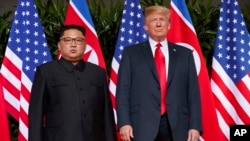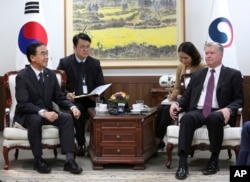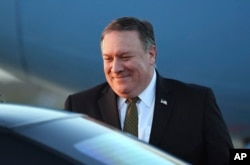In announcing his interest in holding another summit with North Korean leader Kim Jong Un, U.S. President Donald Trump appears to be going against his administration's plan to have working-level officials lead denuclearization talks, analysts say.
On his flight back to Washington from the G-20 Summit in Argentina in early December, Trump told reporters that a second summit with Kim will likely take place in January or February of 2019.
While the United States remains committed to talks with North Korea, it is unclear if Trump's diplomacy can make progress with Pyongyang. In what appeared to be a blow to the administration's efforts to denuclearize the isolated country, North Korea's state media said Thursday the country will not give up its nuclear weapons unless the U.S. first removes what Pyongyang called a nuclear threat.
"When we refer to the denuclearization of the Korean Peninsula, it means the removal of all sources of nuclear threat not only from the North and the South but also from all neighboring areas targeting the peninsula," the official Korean Central News Agency said.
The struggle over the term "denuclearization" was a sticking point even before Trump and Kim met for the first time in June in Singapore, where they issued a vague statement on the denuclearization of the Korean peninsula.
Since then, there has been little apparent progress in the talks. Trump's willingness to meet with Kim again was seen as a high-level intervention to break the impasse.
Mixed messages
Former U.S. officials who have dealt with North Korea extensively, however, caution that Trump's plan to meet with Kim again goes against the administration's position that working-level officials should lead the talks.
"And of course, the future dialogue will take place. It will definitely be something that the Special Representative [Stephen] Biegun will be leading," State Department Deputy Spokesperson Robert Palladino told reporters in late November, only a few days before Trump's announcement on the plans for a second summit. Biegun directs all U.S. policy on North Korea, leads negotiations, and spearheads U.S. diplomatic efforts with allies and partners, according to his State Department bio.
The apparent push by the State Department for working-level talks between Washington and Pyongyang followed North Korea's abrupt cancellation of the planned talks with U.S. Secretary of State Mike Pompeo in early November. Prior to that derailment, Biegun had been expected to meet with his North Korean counterpart but nothing was ever scheduled officially. The U.S. has been seeking working-level talks with North Korean officials since Pompeo's visit to Pyongyang in early October.
Some experts believe Pyongyang is only interested in direct talks with Trump.
"North Korea has refused to hold meetings at the secretary of state or special envoy [level], preferring to hold a summit with Trump who the regime sees as more likely to offer additional concessions as he did in Singapore," said Bruce Klingner, a former U.S. intelligence official who is now a senior research fellow at the Heritage Foundation.
Poor communication
Christopher Hill, chief negotiator with North Korea during the George W. Bush administration, said there may be a communication problem in the administration.
"I don't think there is good communication between NSC [National Security Council] staff and the State Department at this point. I think the big problem is the president doesn't understand that he has a staff that can do things and he only thinks of himself as being able to do things," Hill said.
Klingner agrees.
"I think what it reflects again the administration again has trouble with message discipline and the administration sometimes has one policy and then the president has another," Klingner said.
But Gary Samore, the White House coordinator for Arms Control and Weapons of Mass Destruction under the Obama administration, says the Trump administration appears to be pursuing a two-track approach to talks with the North.
"I think that the two-track strategy is both top-down and bottom-up. It is top-down in the sense that the leaders set the broad outlines of the agreement. And then it is up to the working level officials to actually negotiate the details: sequencing, pace, schedule, verification all of these critical matters. Nobody expects the leaders to negotiate [in] that detail," said Samore.
Christy Lee contributed to this report.






